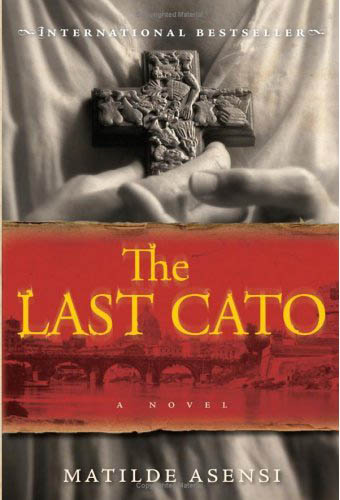
EURO CRIME
Reviews

Asensi, Matilde - 'The Last Cato' (translated by Pamela Carmell)
Hardback: 464 pages (Apr. 2006) Publisher: Rayo ISBN: 0060828579
The discovery of a body decorated with seven crosses and strange symbols leads to Ottavia, a nun in the Vatican, being asked to help decipher their meaning. Besides being a nun, Ottavia also has a doctorate in palaeography and art history and works in the Vatican classified archives. She is asked to work alongside a Swiss guard, Kasper Glauser-Roist, to solve the mystery. Eventually they work out that the symbols spell the word 'Stauros', and the crosses are those from different churches and monasteries around Europe. Ottavia's involvement then seems to come to an end until she is summoned back to help decipher a book, or codex, written by a series of monks who each call themselves 'Cato', that Kasper has taken from a monastery that is the source of one of the crosses. The codex ends at the start of the 13th century, when the last Cato writes about saving the 'true cross' or Lignum Crucis and making their way to an 'earthly paradise', the whereabouts of which are unknown. These protectors of the true cross are known as 'Staurofilakes'. In the present day, it seems that holy relics, fragments of the true cross, have been gradually going missing from many Catholic churches around the world. Is their theft linked to the book? Where is the earthly paradise? Is that where the thieves are? How can they find it?
Ottavia, Kasper and a third person, Prof. Farag Boswell, a Coptic from Egypt who speaks many languages, is an archeologist and has an Italian mother, join forces to discover where the earthly paradise is. Remarkably, the directions seem to be written down in another book, the well known 'Purgatory', which is part of the DIVINE COMEDY, written by Dante and published in 1315, shortly after the last entry in the codex. Kasper claims that Dante found the earthly paradise, was himself a Staurofilake, and betrayed his brothers by writing down in 'Purgatory' how to find the earthly paradise, for which he was killed. Despite the apparent dangerous nature of this quest, the three decide to follow the clues in 'Purgatory' together to find the earthly paradise. This entails going to seven different cities to purge themselves, one by one, of the seven deadly sins, one in each city. Each time they have to work out where to go, and what to do by deciphering the clues from Dante's book, and after each success they are branded by some unknown person with a cross, just like those found on the body discovered at the start of the story. Along the way, Ottavia slowly begins to lose her faith and fall in love with Farag, which conflicts with her vows as a nun.
As such then, the book is not just a quest to reach earthly paradise, but also a love story. It is similar in concepts and ideas to Dan Brown's THE DA VINCI CODE but is a more enjoyable read. There is a wealth of history and politics that is drawn upon in the book, and it is written very much as a quest, rather than a race to find the earthly paradise before some bad guy does. In fact, there are no 'bad guys' to stop them reaching their goal. The only battle is with themselves, with their own intellect, bravery and determination to face each of the trials they have to partake in, as they 'purge' themselves of each sin. As usual with this type of book, one has to suspend disbelief a little. I can't really imagine that a religious sect would spend so much time, and effort on rather sophisticated buildings and machinery so that a small number of people can undergo these trials, for example. It is fairly obvious that the three will eventually find earthly paradise, and interesting to discover what this is. It also quickly becomes clear that Kasper is searching for earthly paradise for his own ends, rather than to recover the true cross, and what happens to him once he arrives is well signposted. The struggle that Ottavia has between her long held beliefs and her conflicting love for Farag is well written, and on the whole it is a book that should be read slowly and savoured, rather than a dash to the finish to find out if they reach their goal. A good book for a wet Sunday afternoon.
Michelle Peckham, England
October 2008
More European crime fiction reviews can be found on the Reviews page.